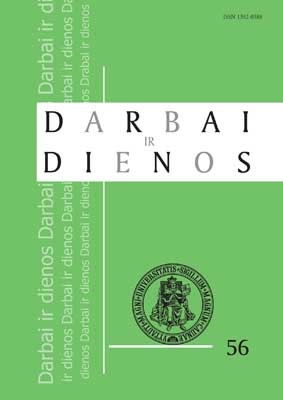Tauta, gimusi iš filologijos, ir lingvistinio nacionalizmo fenomenas
A Nation Emergent from Philology and the Phenomenon of Linguistic Nationalism
Author(s): Giedrius TamaševičiusSubject(s): Cultural Essay, Political Essay, Societal Essay
Published by: Vytauto Didžiojo Universitetas
Keywords: filologija; lingvistika; nacionalizmas; philology; linguistics; nationalism
Summary/Abstract: Cz. Miłoszo prarastoji Tėvynė – Abiejų Tautų Respublika – dažnai suvokiama kaip ryškiausia Vidurio Europos fenomeno apraiška ir pilietinės visuomenės pirmtakė. 2011 m. rugsėjį Vroclave surengto Europos kultūros kongreso inauguracinėje kalboje apie tai kalbėjo ir Zygmuntas Baumanas, Abiejų Tautų Respubliką įvertinęs kaip šiandieninei Europai aktualią alternatyvą politinei Vestfalijos sistemai, religinės ir kultūrinės tolerancijos pavyzdį (Bauman 2011). Leonidas Donskis plėtoja šią mintį teigdamas, kad dėl savo daugiakultūrės patirties Lenkija ir Lietuva iškyla kaip Europos Sąjungos istorinis prototipas ir sykiu modelis, atveriantis duris daugybei nepatogių klausimų dėl šiuolaikinės Lietuvos santykio su Cz. Miłoszo Lietuva. “Modern Lithuania emerged from philology and language” – the validity of these words by Czeslaw Miłosz from his book In search of a Homeland is newly confirmed by the discussions about the threats against the destiny of the Lithuanian language and the future of the nation. The historical period described by Miłosz (the end of the 19th century and the beginning of the 20th century) is still a kind of ‘dreamtime’ not only for Lithuanian nationalism, but also for the language ideology – this is the time when standard Lithuanian was born. The Herderian theory of nationalism assigns the following functions to the language: to represent the nation, to mobilize it, and to separate it from others. These are also the cornerstones of the current Lithuanian language ideology inspired by the ideas of the Lithuanian national revival. The fidelity to this tradition at the beginning of the 21st century increases tensions between the Westphalian model of nation states and the processes of integration into the Western world.
Journal: Darbai ir dienos
- Issue Year: 2011
- Issue No: 56
- Page Range: 143-152
- Page Count: 10
- Language: Lithuanian

